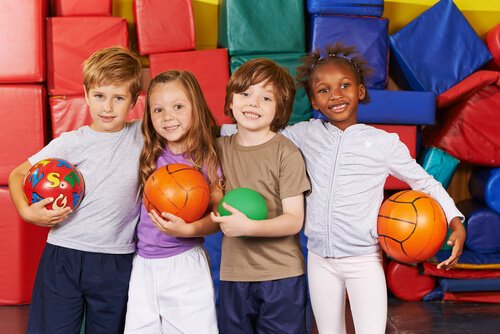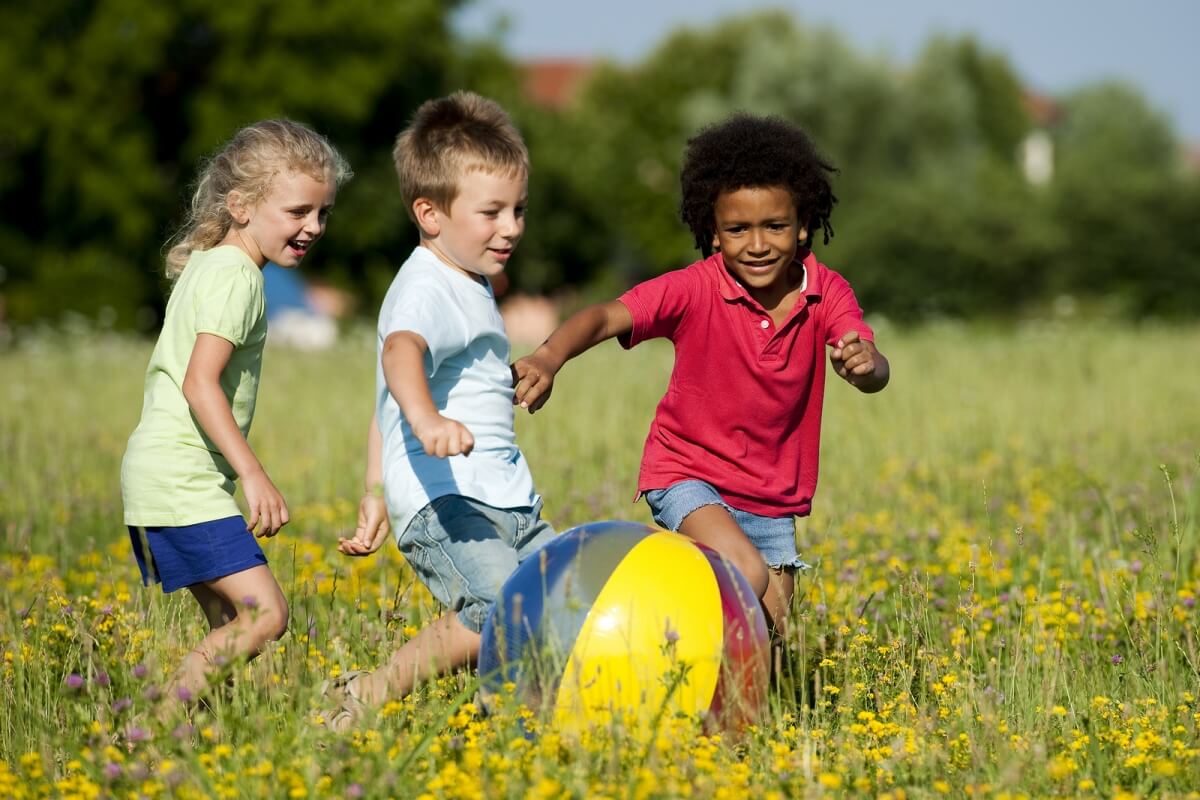How to Teach Your Children to Respect Differences

Society is increasingly diverse. Because of this, children are increasingly exposed to living with people with different ways of life. Beliefs, customs, values and behaviors test people’s tolerance and empathy. That’s why it’s important to teach children to respect differences when they’re young.
Wars, ideological conflicts and confrontations are due to lack of respect for others. If you want your children to become social justice warriors, you might want to put these recommendations into practice.
5 ways to teach your children to respect differences
The ability to respect others will benefit your children for their whole lives. Valuing diversity will help them become better people, have new ideas and strengthen their minds and social relationships.
1. Model the behaviors you want to see
Be the example. You must start by respecting others, by celebrating differences and being inclusive all the time.
Start by evaluating how you behave before demanding or forming behavioral patterns in your children. Avoid discriminatory jokes and feeding into stereotypes. These affect how your children see other people.
Respect is a value, a virtue. To know what it is, I must start with myself. At the same time, I acquire abilities of respect for others. Not only regarding opinions, but also feelings. Once I understand this, I start to know that I must listen and listen. I control myself, I know my limits, I assume an attitude of respect, I project it onto others and I value those around me.
–Dora Herrera–
2. Help children build their self-esteem
If you want your child to respect differences, focus on developing their self-esteem first. Self-confident people in general, especially children, are better able to embrace others without trying to change them.
Children with good self-esteem are able to trust their own decisions. Certainly, they won’t follow the crew. They can defend their beliefs without trying to tear others’ beliefs down.

3. Allow your children to live new experiences
It’s common for people to seek relationships with people who share beliefs and that resemble them. However, the key to welcoming completely different human beings is to live with them.
Don’t encourage your children to always stay in their comfort zones. Help them want to know and explore the world through other people’s eyes.
4. Prepare to answer questions
This part is inevitable. Children want you to explain behaviors and things that are unusual to them. If this happens, you need to be prepared to deal with the situation properly.
Take these things into consideration:
- Focus on the positive things. The best way to respond when your child asks you about different races, sizes, ways of dressing or languages is to be positive, direct and honest.
- Don’t avoid their questions. Whenever they ask you something, give them an answer. Kids need information to form ideas about life and society.
- Reinforce good manners. Little kids aren’t aware of social norms. Therefore, it’s so important that you teach them to be respectful when they’re exposed to them.
- Help them understand that differences are good and that we’re all the same in some ways. Show them that these traits make us special. However, as diverse as we may be, we always have something in common.

5. Make tolerance a fundamental principle
Children should respect all people equally, no matter how they look or what they do. It’s a lesson you should teach your children many times. This way, they can apply and internalize it.
One way to enforce this is through media. Children’s books, movies and games can have great lessons.
Remember: the first step for your children to learn to respect differences is to do it yourself. We live in a big world. There are lots of cultures and social ideas that we should know and accept.
Discriminating and avoiding others only makes us lose the greatness in each individual person.
Society is increasingly diverse. Because of this, children are increasingly exposed to living with people with different ways of life. Beliefs, customs, values and behaviors test people’s tolerance and empathy. That’s why it’s important to teach children to respect differences when they’re young.
Wars, ideological conflicts and confrontations are due to lack of respect for others. If you want your children to become social justice warriors, you might want to put these recommendations into practice.
5 ways to teach your children to respect differences
The ability to respect others will benefit your children for their whole lives. Valuing diversity will help them become better people, have new ideas and strengthen their minds and social relationships.
1. Model the behaviors you want to see
Be the example. You must start by respecting others, by celebrating differences and being inclusive all the time.
Start by evaluating how you behave before demanding or forming behavioral patterns in your children. Avoid discriminatory jokes and feeding into stereotypes. These affect how your children see other people.
Respect is a value, a virtue. To know what it is, I must start with myself. At the same time, I acquire abilities of respect for others. Not only regarding opinions, but also feelings. Once I understand this, I start to know that I must listen and listen. I control myself, I know my limits, I assume an attitude of respect, I project it onto others and I value those around me.
–Dora Herrera–
2. Help children build their self-esteem
If you want your child to respect differences, focus on developing their self-esteem first. Self-confident people in general, especially children, are better able to embrace others without trying to change them.
Children with good self-esteem are able to trust their own decisions. Certainly, they won’t follow the crew. They can defend their beliefs without trying to tear others’ beliefs down.

3. Allow your children to live new experiences
It’s common for people to seek relationships with people who share beliefs and that resemble them. However, the key to welcoming completely different human beings is to live with them.
Don’t encourage your children to always stay in their comfort zones. Help them want to know and explore the world through other people’s eyes.
4. Prepare to answer questions
This part is inevitable. Children want you to explain behaviors and things that are unusual to them. If this happens, you need to be prepared to deal with the situation properly.
Take these things into consideration:
- Focus on the positive things. The best way to respond when your child asks you about different races, sizes, ways of dressing or languages is to be positive, direct and honest.
- Don’t avoid their questions. Whenever they ask you something, give them an answer. Kids need information to form ideas about life and society.
- Reinforce good manners. Little kids aren’t aware of social norms. Therefore, it’s so important that you teach them to be respectful when they’re exposed to them.
- Help them understand that differences are good and that we’re all the same in some ways. Show them that these traits make us special. However, as diverse as we may be, we always have something in common.

5. Make tolerance a fundamental principle
Children should respect all people equally, no matter how they look or what they do. It’s a lesson you should teach your children many times. This way, they can apply and internalize it.
One way to enforce this is through media. Children’s books, movies and games can have great lessons.
Remember: the first step for your children to learn to respect differences is to do it yourself. We live in a big world. There are lots of cultures and social ideas that we should know and accept.
Discriminating and avoiding others only makes us lose the greatness in each individual person.
All cited sources were thoroughly reviewed by our team to ensure their quality, reliability, currency, and validity. The bibliography of this article was considered reliable and of academic or scientific accuracy.
- Wild, R. (2011). Libertad y límites. Amor y respeto: Lo que los niños necesitan de nosotros. Herder Editorial.
- Morales Jaimes, O. D., & Silvera López, D. G. (2019). INFLUENCIA DE LOS JUEGOS COOPERATIVOS EN EL DESARROLLO DEL VALOR DE RESPETO EN LOS NIÑOS Y NIÑAS DE LA INSTITUCIÓN EDUCATIVA INICIAL Nº 33″ CORAZÓN DEL NIÑO JESÚS” DE LA TINGUIÑA-ICA. http://repositorio.unh.edu.pe/handle/UNH/3030
- Calderón, M. (2012). La educación inclusiva es nuestra tarea. https://repositorio.minedu.gob.pe/handle/20.500.12799/1791
- Batallán, G., & Campanini, S. (2007). El” respeto a la diversidad” en la escuela: atolladeros del relativismo cultural como principio moral. Revista de Antropología Social, 16, 159-174. https://www.redalyc.org/pdf/838/83811585006.pdf
- Vinasco, I. C. A. (2018). Ambientes escolares: Un espacio para el reconocimiento y respeto por la diversidad. Sophia, 14(2), 84-93. https://dialnet.unirioja.es/servlet/articulo?codigo=6522059
This text is provided for informational purposes only and does not replace consultation with a professional. If in doubt, consult your specialist.








